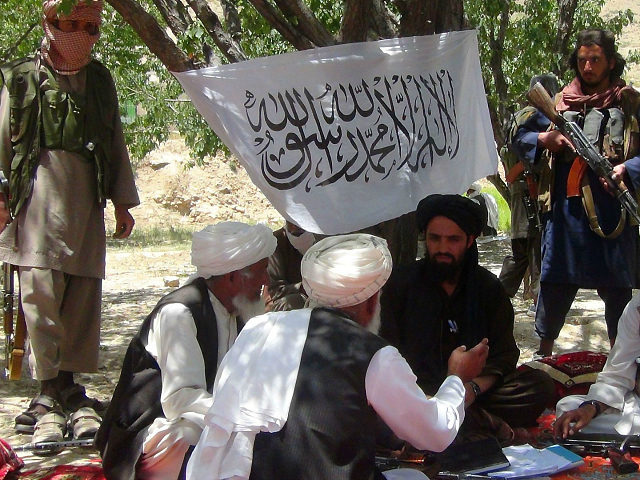The arrest of a senior Taliban terrorist by authorities in Pakistan prompted the leader of the narco-jihadi group to warn members to “stay alert,” BBC reported on Tuesday.
Some sources within the terrorist group told BBC that Pakistan’s arrest of Hafez Mohibullah — identified as the religious affairs minister when the Taliban regime ran Afghanistan before U.S. troops deposed it in late 2001 — is an attempt to put pressure on the jihadis to engage in peace negotiations with the Afghan government, which recently hit a snag.
“They arrested him to send a message,” an anonymous Taliban source told BBC.
“There was a meeting with Pakistani officials on the upcoming peace talks which ended in arguments. Right afterwards, the authorities raided a number of houses and arrested Mohibullah. After that [Taliban leader] Sheikh Hibatullah sent a message warning everyone to be alert,” another Taliban source told the news outlet.
Pentagon officials have long accused Pakistan of harboring the Afghan Taliban and its Haqqani Network, an assertion that Islamabad denies.
Under U.S. President Donald Trump, the United States suspended hundreds of millions in funding to cash-strapped Pakistan over Islamabad’s refusal to take decisive action against the Taliban and its Haqqani Network allies to no avail until the recent arrest.
After accusing Pakistan of “doing nothing” to combat the Taliban, President Trump reached out to Prime Minister Imran Khan for assistance in bringing the jihadi group to the negotiation table last year.
Now, BBC reports that Pakistani authorities are holding Taliban senior member Mohibullah in Peshawar, adding:
Taliban sources say Hafez Mohibullah had been living in the city for a number of years. Two high-ranking Taliban figures, talking on condition of anonymity, suggested the former minister had been detained to put pressure on the group into meeting [Trump’s Afghan reconciliation envoy] Mr [Zalmay] Khalilzad in Pakistan this week, and crucially to agree to meet representatives of Afghan President Ashraf Ghani.
Primarily citing America’s insistence for the group to speak directly with the Afghan government, the Taliban recently canceled a meeting with U.S. officials.
A Taliban terrorist, speaking on condition of anonymity, told Voice of America (VOA) this week that the group has “halted” the fledgling U.S.-initiated peace negotiations.
The Trump administration has made “political reconciliation” between Kabul and the Taliban the primary goal of its strategy to end America’s longest foreign military engagement in Afghanistan.
In recent months, the Trump administration has intensified its peace-seeking efforts in Afghanistan via Khalilzad. However, the terrorist group has repeatedly refused to meet with the Afghan government, which has offered the organization a ceasefire and official recognition as a legitimate group.
The Trump administration supports Kabul’s offer to the Taliban, which considers the Afghan government to a be a puppet of the United States.
“I think there has been a change in Pakistan’s policy. The military and ISI [intelligence service] are trying to persuade, cajole the Taliban into meeting both the Americans and Kabul government,” Analyst Ahmad Rashid told the BBC.
“One of the main pressures [on Pakistan] is coming not from the Americans but from the Saudis and UAE [United Arab Emirates],” he added.
Pakistan, Saudi Arabia, and the UAE were the only countries that officially recognized the Taliban regime during its brief rule (1996 to 2001) over Afghanistan.
With the help of record cultivation of opium and production of the plant’s heroin derivative, the Taliban’s influence and strength reached unprecedented proportions after the U.S. and NATO declared their combat mission in Afghanistan over at the end of 2014. Taliban terrorists generate most of their funding from trafficking opium and heroin, including some that are partly fueling the drug overdose epidemic in the United States.
According to the U.S. Special Inspector General for Afghanistan Reconstruction (SIGAR), a watchdog agency, terrorist groups in the war-devastated country, mainly the Taliban, control or contest 45 percent of Afghanistan.
In January 2018, a BBC assessment revealed that the Afghan Taliban — which is fighting to implement strict Islamic laws, or sharia, across Afghanistan — was active in almost 70 percent of the country at the time.
“In October, Pakistan released a founding member of the Taliban, Mullah Barader from detention, reportedly to allow him to play a role in peace negotiations,” BBC notes.

COMMENTS
Please let us know if you're having issues with commenting.